- Joined
- Jan 27, 2011
- Location
- Beautiful Sunny Winfield
I thought I'd post this thought based on what I see benchmarking performance of some recent disks. I've replaced the NVME SSD in my laptop with a newer bigger and FASTER one. To make see what I was getting, I ran some benchmarks. The interesting one was the one included with Gnome Disks (disk utility that comes with the Gnome desktop on Linux.) Unique among the benchmarks I ran, it shows a plot of performance vs. time. For example, this is the OE SSD (Toshiba NVME) before I performed a secure erase.

The most noticeable thing about it is the miserable write performance. I've got faster SATS SSDs! After about 18 months of use (including dual boot Windows and several variants of Linux) it shows 8% use. And it is nearly full. (That's why I'm replacing it. A couple VMs for testing a project and too many ZFS snapshots and the disk space goes fast!) The second thing to do before re-purposing it is a secure erase. (First is to backup everything on it.) The secure erase returns all blocks to zeroes and prepares the disk for further use. The next benchmark looks like

Reads are faster and writes improved a little bit. (Access time also improved.) The interesting thing is that the write performance started out higher than what can be achieved using a SATA drive and then dropped to the other performance. This is because some sort of caching is going on. Some drives use RAM and others use faster flash memory. In either case, the drive can handle the incoming data faster and then transfer it to slower (and cheaper) flash in the background.
I suspect that for normal workloads, this drive would be operating in the left hand side of the curve, providing reasonable performance. Maybe. This particular benchmark doesn't readily indicate the point where the performance changes in terms of data transferred. I'm not sure I could calculate that from the information shown w/out knowing what the benchmark does behind the scenes.
It seems like this would be useful information to know when making a purchase decision. (I bet it would highlight the difference between the PRO and EVO lines of Samsung SSDs.)
And FWIW, I went with an HP EX950 for a replacement. I found it on sale and so far it does not disappoint. Benchmark results for it are

I'll add some common Windows benchmarks if Win10 still boots.



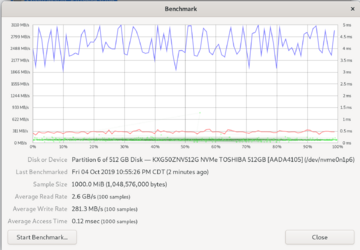
The most noticeable thing about it is the miserable write performance. I've got faster SATS SSDs! After about 18 months of use (including dual boot Windows and several variants of Linux) it shows 8% use. And it is nearly full. (That's why I'm replacing it. A couple VMs for testing a project and too many ZFS snapshots and the disk space goes fast!) The second thing to do before re-purposing it is a secure erase. (First is to backup everything on it.) The secure erase returns all blocks to zeroes and prepares the disk for further use. The next benchmark looks like
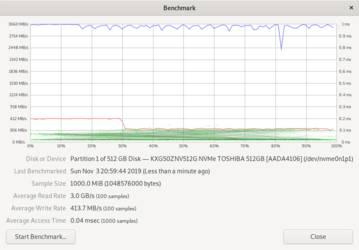
Reads are faster and writes improved a little bit. (Access time also improved.) The interesting thing is that the write performance started out higher than what can be achieved using a SATA drive and then dropped to the other performance. This is because some sort of caching is going on. Some drives use RAM and others use faster flash memory. In either case, the drive can handle the incoming data faster and then transfer it to slower (and cheaper) flash in the background.
I suspect that for normal workloads, this drive would be operating in the left hand side of the curve, providing reasonable performance. Maybe. This particular benchmark doesn't readily indicate the point where the performance changes in terms of data transferred. I'm not sure I could calculate that from the information shown w/out knowing what the benchmark does behind the scenes.
It seems like this would be useful information to know when making a purchase decision. (I bet it would highlight the difference between the PRO and EVO lines of Samsung SSDs.)
And FWIW, I went with an HP EX950 for a replacement. I found it on sale and so far it does not disappoint. Benchmark results for it are
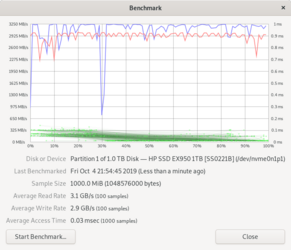
I'll add some common Windows benchmarks if Win10 still boots.
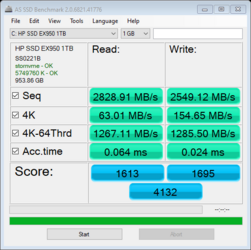
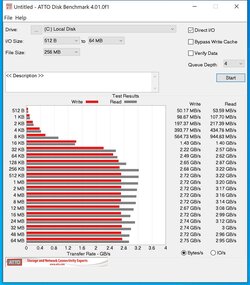
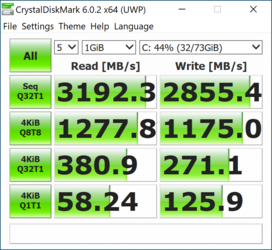
Last edited: